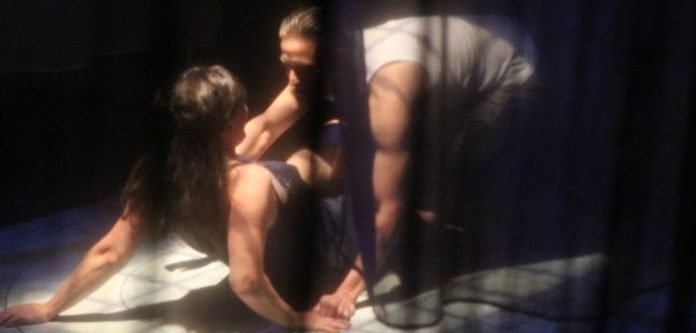With Espresso, playwright Lucia Frangione has managed to boldly distill what millions of people of faith spend entire lifetimes to understand: their relationship to god.
[pullquote]Bold, courageous and filled with open-hearted performances, Espresso is a perfect end to Pacific Theatre’s 30th anniversary season.[/pullquote]At its surface, Espresso tells the story of an Italian family coping with the life-threatening accident of their patriarch, Vito. And even as that tragic story is compelling, it is in Frangione’s deeper spiritual exploration that gives Espresso a consummate emotional and spiritual complexity that is challenging, surprisingly honest, and sometimes oh so very sexy.
With Frangione in the central role of daughter Rosa, she and Robert Salvador alternate as narrator and in portraying the large Italian clan as they wait in vigil for news of the Vito’s recovery. Along with the daughter, there is Vito’s second wife Vincenza and his mother Nonna. Cleverly using the relationship of daughter and mother to Vito as a representation of the father and son part of the trinity equation, Frangione steps into more ethereal territory to complete the trio with the introduction of Amante.
It is in the relationship between Amante and the women where Frangione finds the spiritual center of her play, using the often times tumultuous relationship we can have with our lovers as a symbol for the equally challenging connection with our gods. At times looking for solace in their arms, or wounded by their seeming indifference to what really matters, Frangione has been able to extract the essence of an often times complex spiritual quest, to a relatable metaphor. But while it all may sound very intellectual, heady and faith-based, Frangione skillfully combines it seamlessly with a humanity that is also surprisingly funny and very real.
Moving effortlessly between its multiple characters, Frangione and Salvador manage a breathtaking clarity even as they are often times required to trade off their characters in mid-scene. A tribute to Frangione’s skill as a playwright, she paints vivid pictures that go beyond what we see on stage. Having lived with the family since originally writing the play in 2003, there is no question Frangione’s intimate knowledge of who they are translates on the stage; there is also little doubt that Salvador and director Sarah Rodgers benefit from having the playwright in the cast.
Director Rodgers keeps the story in constant movement, wrapping it inside Stancil Campbell’s wonderful set that includes the purifying presence of rain and a lighting design that moves us effortlessly from the real to the spiritual. In a recent interview, Rodgers said that her use of the transparent curtains that are at times extended between stage and audience are an homage to the original production, but while they do provide the intended ethereal quality as memory and a cue to the hospital, it is also becomes a distraction as they are noisily pulled open and close.
Bold, courageous and filled with open-hearted performances, Espresso is a perfect end to Pacific Theatre’s 30th anniversary season. But don’t risk waiting for a future anniversary production, go see this remarkable play now.
Espresso by Lucia Frangione. Directed by Sarah Rodgers. A Pacific Theatre Production. On stage at Pacific Theatre (1440 W 12th Ave) through June 14, 2014. Visit https://pacifictheatre.org for tickets and information.

